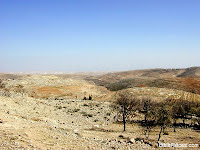I have a Bible reading plan and try to stick to it. Wednesday morning I picked up a devotional book (I use them mostly for reference) and started reading about a particular incident in 1 Samuel 26. Here’s the scene: David is running for his life as Saul is chasing him with 3,000 chosen men of Israel. Saul camps just off the road not far from where David is camping in the wilderness.

I like v. 4, “
David sent out spies, and he knew that Saul was definitely coming.” Hard to miss 3,001 men a place like this. Yep, they’re coming.
So Saul camps on David’s doorstep. David wants to go down into the camp of his potential assassin and takes his nephew Abishai with him. They get down there and find Saul asleep and surrounded by all these people. No, I don’t know what he was thinking either; but, we do know what was on Abishai’s mind: “
Today God has delivered your enemy into your hand; now therefore, please let me strike with him the spear to the ground with one stroke, and I will not strike him a second time.” (1 Samuel 26:8).
David denies the request giving two reasons: “‘
Do not destroy him, for who can stretch out his hand against the Lord’s anointed and be without guilt.’ David also said, ‘As the Lord lives, surely the Lord will strike him, or his day will come that he dies, or he will go down into battle and perish.” (1 Samuel 26:9-10)
Here’s what grabbed me: Saul had been the hope of the people, a physical and visible leader that offered deliverance. Saul proved himself disobedient to the commands of God, a man after his own heart. He demonstrates so much uncertainty that other leaders back away from him. Now the king is galavanting around the land on his own agenda with no regard for the people of the land nor for the Philistine threat against them. The state of the nation is (in short) “a battleground.”
I believe I can safely say that there was no person on the planet more disagreeable to David than Saul. David had the opportune moment to take Saul out, and what does he do? David calls Saul names--“the Lord’s anointed.” What do you imagine David was feeling, looking down at the man who single-handedly changed the lifestyle of a nation--and him as an individual? What was he feeling? What about those who agreed with how the king was thinking, the direction he was taking the country?
Now look at what David says: 1) touch “the Lord’s anointed” with guilt; 2) God will take him out on His agenda.
God is up to something and we can be certain it has everything to do with His glory. David was on God’s time, watching this crazy king from over his shoulder as he jeopardized the entire kingdom; but it was not time for the king to leave office. David must wait in a manner that preserves his integrity--albeit in exile. He could have taken what was rightfully his, but is this the way to achieve God’s will? God’s will for whom?
I sort of feel like I’m in David’s sandals right now, walking away from the camp of sleeping Saul. I am frustrated, disappointed, angry, frightened, tired, grieved. But I could do no better job. Could someone else? David sure had a lot of backing. Did David walk into Saul’s camp thinking, “I can do a better job for this country--and stop running” a thousand times before breakfast--but could he force God’s will? What would be the outcome?
Perhaps there is someone who could do a better job, but right now. Much more terrible people are on their way and God will take them out in God-glorifying ways.
Something else to think about: God was not finished with the leader-in-office and God was not finished the nation, either. They had to carry out what God's plan involved for them.
Keep reading God’s unchanging Word and find that things are not going to get better until God is ready. Watch the skies for The King, who is coming. He will do the job the best way, as only He can.


 I like v. 4, “David sent out spies, and he knew that Saul was definitely coming.” Hard to miss 3,001 men a place like this. Yep, they’re coming.
I like v. 4, “David sent out spies, and he knew that Saul was definitely coming.” Hard to miss 3,001 men a place like this. Yep, they’re coming.